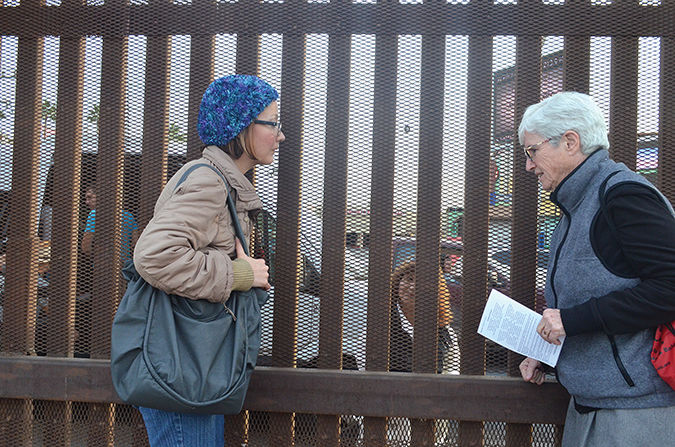CALEXICO — When the time came to exchange the sign of peace, two people extended their hands, but could never reach each other. A huge wall stood in their way.
Under the watchful eye of the U.S. Border Patrol, posted in SUVs and bicycles along every point of the U.S.-Mexico border, about 50 people gathered Dec. 21 on the U.S.-side to celebrate the Posadas Sin Fronteras (“Posadas Without Borders”). They offered their fraternal sign of peace and love to people who gathered at the Mexico side to pray together for for peace, for government leaders, and for immigration reform.
A relic of San Toribio Romo, popularly known as patron saint of immigrants, was on hand. The relic is a bone from his left ankle encapsuled in a golden container inside the chest of the saint’s traveling four-foot tall statue. The event marks the first time the relic has been taken to the Calexico-Mexicali border.
The people on the U.S. side were just coming back from Terrace Park Cemetery after participating at an open-field Mass for unnamed immigrants who died in the desert or while trying to cross the Rio Grande.
“The Mass at the ‘Potter’s Field’ and the Posadas Sin Fronteras in Calexico highlight the fact that our nation still needs a just immigration reform,” said Father Ed Benioff, director of the Office of New Evangelization.
The gravesite, known as “Potter’s Field,” a name derived from the Bible to refer to the burial site of the unwanted and destitute, is hidden and no one has access to it, except the cemetery maintenance personnel. The more than 400 graves are marked only with concrete blocks, nearly half of which are inscribed John or Jane Doe.
It was the first time that locals had ever crossed the wired gate covered with a green plastic and walked through the muddy soil to the gravesite. They said it was thanks to Santo Toribio’s presence.
“The presence of his relics at these events underlines the reality that Heaven is with us in our struggles and that the blessed are praying for a dignified treatment of all peoples,” Father Benioff said.
Burials of unclaimed immigrants and homeless stopped in 2007, according to Martin Sanchez, a maintenance person working at the cemetery for the past 30 years. Their remains are cremated and thrown to the ocean, he said.
“It’s very sad,” said Sanchez, an immigrant who crossed the Mexicali-Calexico border with his parents when he was 3 years old. “It seems it’s all about money.”
“Santo Toribio’s relic in the cemetery calls attention to the forgotten,” said Father Edward Horning, pastor of El Centro’s St. Mary’s Church, who celebrates a yearly Mass during All Souls Day at the cemetery where the unnamed immigrants rest. “To restore their dignity, those from the Catholic faith celebrate through a Holy Mass. Praying for the dead honors the souls that are now untethered from any national borders.”
The relics of Santo Toribio, who was canonized in 2000 by Pope John Paul II because of his martyrdom during the Cristero War, or persecution of Catholics in Mexico during the 1920s, were then taken to the Posadas — Spanish for lodging or accommodation. Posadas are also the name of a Christmas tradition which reenacts Mary and Joseph’s journey to Bethlehem before Jesus’ birth.
In a slight twist on Mexican tradition, “Posadas Without Borders” participants sang as if the Holy Family’s search to find a place for shelter and rest had taken place along the U.S.-Mexico border.
“My child is about to born and I don’t have a place to go; after jumping up the wall my wife was left alone,” sang the people on the Mexico side.
“Do not keep pleading, come to our community where we will all work together for justice and dignity,” responded the choir on the U.S. side.
“Much like the celebration of the humble manger from which a savior was born, this posadas honors the immigrant’s experience of sacrifice in order to find a home,” said Father Horning, who 10 years ago inherited the traditional celebration from the Scalabrinians, the religious order whose ministry focuses on immigrant communities around the globe, and former administrators of St. Mary’s in the Diocese of San Diego.
“This is a little pilgrimage that offers us an opportunity to loosen up from things we’re accustomed to,” said St. Catherine of Siena’s pastor, Father Paul Griesgraber, traveling on the bus with his flock. This is about “crossing that place inside our hearts to discover that there’s a hidden Christ in each one of us. Crossing these little frontiers, these little borders, on the outside is not such a big deal. The bigger border we have to cross is finding Christ within.”
In a similar way, Sister Sheila McNiff put her expectations from the pilgrimage on the spiritual realm.
“I’m expecting that we’ll grow in understanding of the Posadas because our brothers and sisters [crossing the border] can’t find home; if seeing this causes us to take action,” said the principal of St. Catherine of Siena School, which, through a program known as the Quica Project, maintains an open enrollment policy for all families, regardless of their legal or economic status. Quica was the older sister of Santo Toribio Romo, who encouraged and financed his priesthood.
For more information about the yearly funeral Mass for the unnamed immigrants who die on the Calexico-Mexicali border, call Mary Star of the Sea Church, Diocese of San Diego, (760) 352-4211.

